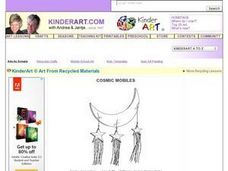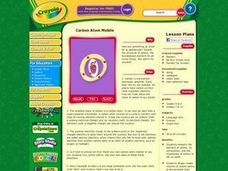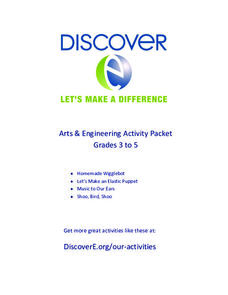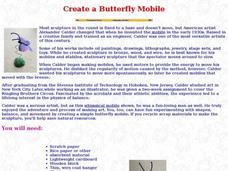Curated OER
Cosmic Mobiles: Recycled Art
If you have a little left over tinsel and aluminum foil, your class can create these fun moon and star mobiles. Poster board or recycled cardboard become your moon and stars; the tinsel gives them sparkle. This would be a great...
Intel
Forensics: Get a Clue
Although the methods are all scientific, forensic science was started by police officers rather than scientists, who relied on observation and common sense. Young detectives use many tools to solve crimes around the school in a...
Cal Recycle
Conserving Natural Resources
Trying to plan an engaging elementary science unit on natural resources? Conserve your energy! This five-part series of lessons and hands-on activities has exactly what you need to teach young scholars about the importance of conservation.
Curated OER
Carbon Atom Mobile
Students research the element of carbon, its composition, and the importance of carbon to life on earth. Then they design model mobiles of carbon atoms to demonstrate their understanding of the configuration of protons, neutrons, and...
DiscoverE
Arts and Engineering Activity Packet: Grades 3-5
Art and science sometimes go hand in hand. A set of four activities for learners in grades 3-5 teaches engineering concepts as part of art projects. Class members build homemade robots, elastic puppets, musical instruments, and...
Curated OER
Make a Nature Mobile
Learners take nature walks to collect items from the environment such as leaves, shells, branches, feathers, and seeds. Working in groups, they assemble their items into mobiles and display them in the classroom.
Curated OER
Create a Butterfly Mobile
Learners construct a butterfly mobile. In this visual arts activity, students use rice paper, watercolors, a coat hanger, and wax paper to create a unique butterfly mobile. Learners use photographs of butterflies to construct a realistic...
Curated OER
Mobile Forces
Students design and build original mobiles and consider how the forces of gravity and convection air currents affect the finished piece. They explore how an understanding of balancing forces is important in both art and engineering design.
Curated OER
Satellite Mobiles K-2
Students explore satellites and their function. They view a photo essay about the many kinds of satellites and the jobs they do. Afterwards, they construct satellite mobiles, discuss the various features of their satellites, as well as...
Discovery Education
Sonar & Echolocation
A well-designed, comprehensive, and attractive slide show supports direct instruction on how sonar and echolocation work. Contained within the slides are links to interactive websites and instructions for using apps on a mobile device to...
Curated OER
Mammal Mobile
Short but sweet. Younger learners will view images and hear about the characteristics that make-up mammals, they will then discuss why a particular animal is, or is not, a mammal providing specific details. They will then create a mammal...
NOAA
Motion from the Ocean
Create a fish mobile using cardboard and string to hang in the classroom while studying ocean life. Each printable requires pupils to cut out two of the same fish to create consistency on the front and back.
Curated OER
Smogasbord
When your environmental or earth science class is studying air pollution, you will want to take the time to go over this resource. Pupils peruse the history of air pollution regulations and examine outstanding diagrams of what...
Curated OER
Praire Biome Models
Fifth graders, in groups, list the physical characteristics of a biome and think of ways in which animals might have to adapt to live there and make a biome mobile ball that show the different types of habitats that shape the praire biome.
Curated OER
Flying Bird Fact-Finds
Students investigate how to recognize, feed, and shelter backyard birds, design paper birds similar to one local species, and design and construct three-dimensional mobiles to display interesting facts and information they gather about...
Curated OER
Bringing Rain
Students research folklore and scientific information about rain and water cycles. Then they communicate their understanding of water cycles by creating mobiles showing each stage. Students also write their own folk tales, explaining the...
National Wildlife Federation
Yesterday: Our Energy Needs Over Time
How has our relationship to energy changed over time? An engaging exploration challenges learners to create a timeline showing human energy needs and uses over time. Scholars review what timelines are, choose a 50-year period in history...
Curated OER
Balancing Mobile Time Line
Second graders create balancing mobiles using 5 labeled items that represent them and different time periods of their lives.
Curated OER
Exploring Basic Physical Science Concepts
Students use the concepts of simple machines to construct a mobile. The inquiry is made in groups and presentations are made by constructing reports. The assessment is based upon the final product of the mobile and how students use...
Curated OER
Food Web Mobile
Students explain the main concepts of food webs and food chains. They
describe the role of animals, plants, and other organisms in cycling energy and matter through a food web by creating mobiles. Lesson contains adaptations for all levels.
American Museum of Natural History
Atomic Mobile
Structure an activity around atoms. Learners use their knowledge of the parts of atoms—the protons, neutrons, and electrons—to build a model of a carbon atom. Scholars create a nucleus by using clay balls to represent the protons and...
Curated OER
Madame Marie Curie & The Science of Radioactivity
A student-created, yet comprehensive 37-slide presentation on the life and contributions of Marie Curie awaits your upcoming chemists! With plenty of photographs, this resource introduces the woman who is responsible for our early...
Curated OER
Wired with Alexander Calder
Kids consider how the body functions and moves, how each structure has a specific movement and purpose. They apply that idea as they construct a sculptural piece that moves. For inspiration they look to the work of Alexander Calder,...

























